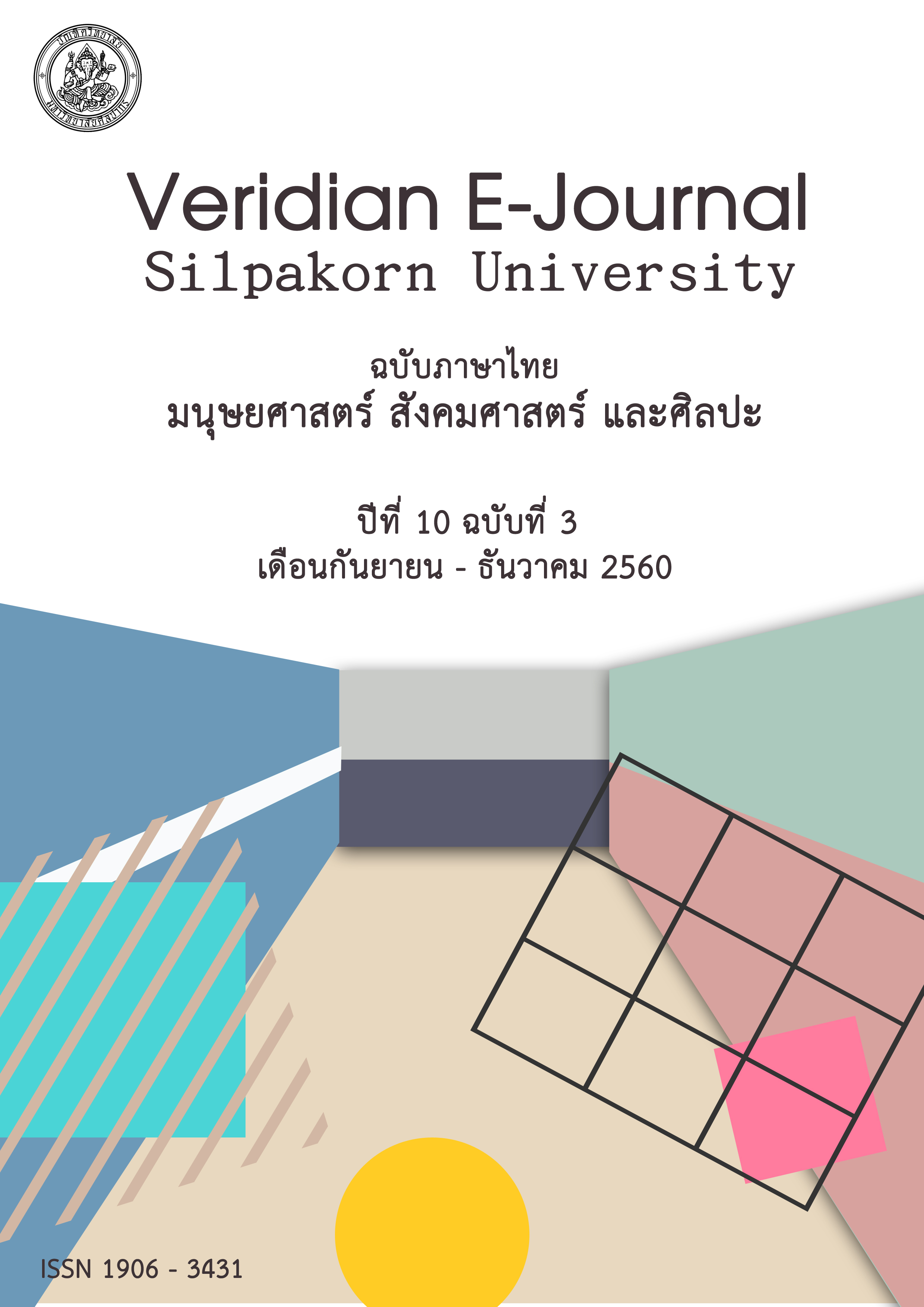ทัศนคติของคนไทยที่มีต่อสิ่งอำนวยความสะดวกของผู้พิการที่ถูกออกแบบเพื่อคนทั้งมวลในที่สาธารณะ
Main Article Content
Abstract
การจัดให้มีสิ่งอำนวยความสะดวกเพื่อผู้พิการในการออกแบบเพื่อคนทั้งมวล (Universal Design) ในประเทศไทย แม้ว่าจะประชาสัมพันธ์เพื่อให้ข้อมูลแต่ยังถือว่าเป็นเรื่องใหม่สำหรับคนไทยโดยทั่วไป ซึ่งเป็นสาเหตุสำคัญที่ทำให้เกิดความไม่เข้าใจเกี่ยวกับการออกแบบเพื่อคนทั้งมวล ปัญหาสำคัญที่สุด คือ ทัศนคติ (Attitude) ของกลุ่มคนทั่วไปที่มีต่อกลุ่มผู้ที่จำเป็นต้องใช้งานสิ่งอำนวยความสะดวกพิเศษ ได้แก่ ผู้พิการ ผู้สูงอายุ เด็ก รวมทั้งความแตกต่างในด้านสถานะ เพศ วัย เป็นต้น จึงทำให้เกิดแนวความคิดที่แตกต่างกันไป บางคนอาจมองว่าไม่มีความจำเป็น บางคนพยายามจัดให้มีแต่ขาดความรู้ความเข้าใจจึงทำให้สิ่งอำนวยความสะดวกนั้นใช้งานไม่ได้หรือใช้ลำบาก บางคนแทบไม่ให้ความสนใจกับเรื่องนี้ ปัญหาเหล่านี้จึงเป็นสาเหตุที่ทำให้สิ่งอำนวยความสะดวกพิเศษที่ปรากฏในสถานที่สาธารณะจึงไม่มีหรือใช้การไม่ได้หรือใช้งานได้ยากหรือไม่ปลอดภัยต่อผู้พิการและกลุ่มอื่นที่มีความจำเป็นต้องใช้งาน ซึ่งมีความแตกต่างอย่างชัดเจนเมื่อเปรียบเทียบกับประเทศที่มีการออกแบบเพื่อคนทั้งมวลอย่างสมบูรณ์ เช่น สิงคโปร์ ญี่ปุ่น ความสำเร็จของประเทศเหล่านั้นเกิดขึ้นจากประชาชนของเขามีวินัย มีทัศนคติที่ดีและมีความเข้าใจเกี่ยวกับการจัดให้มีสิ่งอำนวยความสะดวกพิเศษ ที่สำคัญคือ การรู้จักให้ลำดับความสำคัญ (Piority) การให้เกียรติและความเสมอภาคต่อกัน
ดังนั้น การแก้ไขปัญหาด้านการออกแบบเพื่อคนทั้งมวลเพื่อจัดการสิ่งอำนวยความสะดวกพิเศษในประเทศไทยนั้น จะต้องเริ่มจากการปรับทัศนคติ การสร้างจิตสำนึก เพื่อให้เกิดความเข้าใจและตระหนักในเรื่องนี้ เมื่อทรัพยากรมนุษย์มีทัศนคติและความเข้าใจแล้วจึงจะสามารถนำไปสู่การพัฒนาประเทศและท้องถิ่นเพื่อพร้อมที่จะเข้าสู่สังคมผู้สูงอายุและผู้พิการ โดยเฉพาะอย่างยิ่ง แนวคิดของการออกแบบเพื่อคนทั้งมวลมิใช่เพียงแค่มีเพื่อให้ตอบสนองต่อกลุ่มผู้พิการเท่านั้น แต่ยังเพื่อมีไว้รองรับทุกคน เพราะมันเป็นความจริงที่ว่า ทุกคนย่อมแก่ชราไปตามกาลเวลา และทุกคนมีสิทธิที่จะเกิดความพิการได้จากอุบัติเหตุที่ไม่คาดคิด การออกแบบเพื่อคนทั้งมวลและการจัดให้มีสิ่งอำนวยความสะดวกพิเศษเหล่านี้จึงเป็นการออกแบบเพื่อตัวเราเองในอนาคต
In Thailand, provision of facilities for the disabled based on Universal Design is considered new to people in general even though the concept has been introduced for a while. This has led to misconception about Universal Design. The major issues found are people’s attitudes towards groups of individuals who need these special facilities such as the disabled, elderly, children, and differences in status such as gender and age also spawn varied mindsets. In other words, some people tend to see the facilitation as unnecessary or neglect its importance. Moreover, although some people tried to integrate the concept, they failed to manage it properly due to insufficient knowledge and understanding. Consequently, due to those misconceptions, there are not any special facilities in some public places, or the facilities are dysfunctional, difficult to use, or dangerous for the disabled and others who need them. The situation reflects a marked contrast between Thailand and some countries managing to use Universal Design successfully e.g. Singapore, Japan. The success in in those countries is generated from their citizens’ disciplines, positive attitudes, and precise understanding of the need for special facilities. Especially, one of the keys to success is people’s aware of appropriate priority, mutual respect, and equality.
Therefore, it is essential for people to adjust their attitudes and become conscious of the issue in order to build up understanding, raise awareness, and tackle the problems concerning Universal Design for the special facilities in Thailand. With positive attitudes and vigorous understanding of the concept, it is more likely to successfully drive the country towards both national and local development, which is a fundamental foundation before shifting to the society with ageing and disabled population. The concept of Universal Design not only accommodates the people with disabilities but also facilitates general population because it is undeniable that everybody is ageing and probable to experience disabilities caused by unexpected accident. Indeed, Universal Design and provision of special facilities are truly designed for everyone and our upcoming future.

